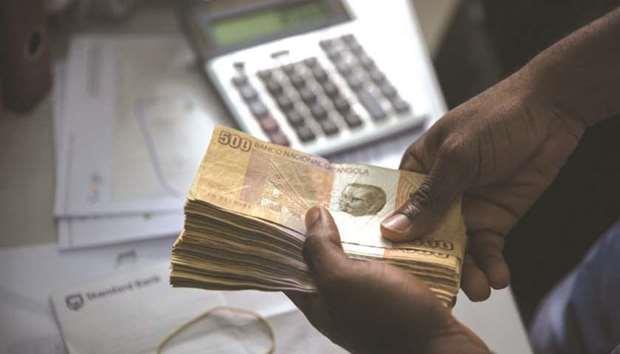
403
Sorry!!
Error! We're sorry, but the page you were looking for doesn't exist.
Angola devaluation is just the start as investors expect more
(MENAFN- Gulf Times) Angola may have devalued its currency by more than 10%, but it will take more than that to end dollar shortages and revive the Opec member's battered economy.
The kwanza weakened 11% to 187.95 per dollar on Wednesday, a day after the central bank let it drop in an auction of foreign exchange, its first since announcing last week it would end an almost two-year peg to the greenback. The currency pared losses on Thursday, rising 1.3% to 185.47 by 9.30am in Luanda, the capital.
It's still much stronger than its black-market rate of about 430, which has barely budged this week. Derivatives traders were expecting a move closer to 200, based on quotes for kwanza one-month non-deliverable forwards of 190/218 per dollar.
The new exchange rate is 'well below the estimated equilibrium level, said Cobus de Hart, an economist at Paarl, South Africa-based NKC African Economics. 'It does not seem as if it was the Banco Nacional de Angola's intention to let the currency depreciate to a market-clearance level immediately.
Africa's second-biggest oil exporter joins a long list of commodity producers, from Russia to Kazakhstan and Nigeria, that have floated or devalued currencies in recent years to stop bleeding reserves. Angola's cash pile more than halved since 2014 as it tried to defend the peg.
The move is part of President Joao Lourenco's efforts to attract investment just three months after replacing Jose Eduardo dos Santos, who ruled the former Portuguese colony for almost four decades. Lourenco had already shaken up the economy by appointing a new central bank governor and sacking Isabel dos Santos, the former president's daughter, as head of the state oil company. This led him to be depicted by Angolans on social media as The Terminator, Arnold Schwarzenegger's movie character.
On Wednesday night, Lourenco dismissed Dos Santos' son, Jose Filomeno dos Santos, as head of Angola's $5bn sovereign wealth fund.
While the devaluation is a 'major change in policy, the kwanza will probably fall further to between 210 and 225 this year, according to Victor Lopes, an economist in London at Standard Chartered. Angola will still have to turn to the International Monetary Fund for financial help, especially given that its shallow debt markets and absence of a stock exchange will prevent it from attracting much portfolio investment, he said.
'A request for IMF assistance is more likely now that elections are over, and given government changes and reduced access to external funding, he said.
The kwanza weakened 11% to 187.95 per dollar on Wednesday, a day after the central bank let it drop in an auction of foreign exchange, its first since announcing last week it would end an almost two-year peg to the greenback. The currency pared losses on Thursday, rising 1.3% to 185.47 by 9.30am in Luanda, the capital.
It's still much stronger than its black-market rate of about 430, which has barely budged this week. Derivatives traders were expecting a move closer to 200, based on quotes for kwanza one-month non-deliverable forwards of 190/218 per dollar.
The new exchange rate is 'well below the estimated equilibrium level, said Cobus de Hart, an economist at Paarl, South Africa-based NKC African Economics. 'It does not seem as if it was the Banco Nacional de Angola's intention to let the currency depreciate to a market-clearance level immediately.
Africa's second-biggest oil exporter joins a long list of commodity producers, from Russia to Kazakhstan and Nigeria, that have floated or devalued currencies in recent years to stop bleeding reserves. Angola's cash pile more than halved since 2014 as it tried to defend the peg.
The move is part of President Joao Lourenco's efforts to attract investment just three months after replacing Jose Eduardo dos Santos, who ruled the former Portuguese colony for almost four decades. Lourenco had already shaken up the economy by appointing a new central bank governor and sacking Isabel dos Santos, the former president's daughter, as head of the state oil company. This led him to be depicted by Angolans on social media as The Terminator, Arnold Schwarzenegger's movie character.
On Wednesday night, Lourenco dismissed Dos Santos' son, Jose Filomeno dos Santos, as head of Angola's $5bn sovereign wealth fund.
While the devaluation is a 'major change in policy, the kwanza will probably fall further to between 210 and 225 this year, according to Victor Lopes, an economist in London at Standard Chartered. Angola will still have to turn to the International Monetary Fund for financial help, especially given that its shallow debt markets and absence of a stock exchange will prevent it from attracting much portfolio investment, he said.
'A request for IMF assistance is more likely now that elections are over, and given government changes and reduced access to external funding, he said.

Legal Disclaimer:
MENAFN provides the
information “as is” without warranty of any kind. We do not accept
any responsibility or liability for the accuracy, content, images,
videos, licenses, completeness, legality, or reliability of the information
contained in this article. If you have any complaints or copyright
issues related to this article, kindly contact the provider above.


















Comments
No comment